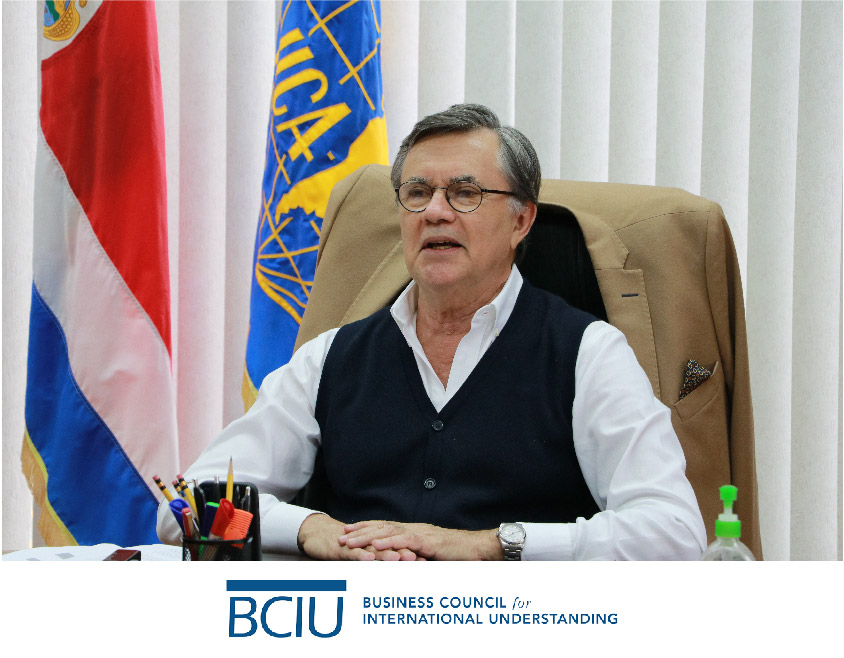Director General of IICA to BCIU: Public-private partnerships are essential for transforming agrifood systems

New York, 6 October 2021 – Building strong partnerships between the public and private sectors and international organizations is key to transforming agrifood systems with the end goal to increase resilience and improve the quality of life in rural areas, said Manuel Otero, Director General of the Inter-American Institute for Cooperation on Agriculture (IICA), at a meeting organized by the Business Council for International Understanding (BCIU).
Otero spoke during a roundtable aimed at exchanging information, sharing ideas and creating a space for collaboration between the agricultural officials of different countries and organizations and representatives of international food production companies.
The meeting was organized by the BCIU to discuss the future of agriculture following the UN Food Systems Summit held on 23 September in New York.
The BCIU is an international organization that promotes collaboration and dialogue between the political leaders of different nations, companies, international organizations and subject matter experts as a way to address more complex global challenges.
BCIU’s 150 members include some of the largest multinational companies in the world, as well as many of the more dynamic small- and medium-sized enterprises.
Global food giant Cargill; IT companies Microsoft and Sentrifuge, both working for the digitalization of agriculture; the United States Agency for International Development (USAID); the embassies of Germany, Mexico, Chile and Argentina in the United States; the United States International Trade Commission; food company Pepsico; the financial advising firm Capital Navigation Strategies; Aquashares—a company specializing in water access solutions; and Israeli agricultural company Fait Holdings were all represented at the discussion.
Luciano Braverman of Microsoft, Conner Davidson of Sentrifuge, David Johanson of the United States International Trade Commission; Anne Murphy of Cargill; James Workman of Aquashares; and Erez Fait of Fait Holdings also shared their perspectives and asked Otero about the future of agrifood systems from the perspective of the Americas and the role they will play in climate change, natural resource preservation and the digital revolution.
“The debate on the future of food systems affects us all as it involves and impacts the future of all human activities. That is why this conversation is so valuable”, stated Patrick Santillo, Senior Vice President of BCIU and roundtable host.
“When I’m asked about the nature of IICA, I say that we’re a bridge institution. We connect countries, institutions and farmers for the transformation of agrifood systems. We are committed to agriculture and rural development and, above all, to improving the quality of life in rural areas”, explained Otero.
IICA’s Director General emphasized that global export statistics show that the Americas are the most important continent in the world in terms of agricultural trade, putting not only the world’s food and nutrition security, but also environmental sustainability, into the hands of the Hemisphere due to its ecological wealth.
Otero recalled that leading up to the Summit, IICA emphasized the need to establish the importance of open, transparent and predictable international trade to favor the positive transformation of agrifood systems.
“18 months ago when the Summit was convened, almost no one spoke of the need to maintain and increase international trade like we did. IICA is fully committed to defending trade as a key tool for food security and for the well-being of rural communities”.
Regarding the mission to increase productivity while conserving natural resources, Otero pointed out the importance of implementing public policies that fully incorporate into the production sector the 16.5 million farming families in the region.
“We need a more socially responsible agriculture. Farmers must be at the center of all decisions. Above all, we must promote the protagonism of women and young people for the future of agriculture and the rural sector”.
According to Otero, one decisive issue is the need to promote the development of the bioeconomy.
“If we want to promote an agriculture that is aligned with environmental and natural resource conservation, that utilizes innovation and technology to increase productivity and income, then we must make use of waste, of soil biomass, and use all raw materials that can be industrialized. We are working to train 3,000 people on the continent in the basics of the bioeconomy”, he stated.
IICA played a major role in the process leading up to the Food Systems Summit. The Institute promoted and coordinated an extensive dialogue and consensus-building process that culminated in a document backed by all the countries of the Hemisphere. The document contains 16 key messages on the irreplaceable role of agriculture, the role of farmers as protagonists of food production and the conviction that agriculture is part of the solution to the challenges facing humanity.
“We were the only continent in the world to present a unified message. Now we must move forward and strengthen our position, because we’re key actors in nutrition and food security”, stated Otero.
“We have opened IICA’s doors to the private sector and NGOs. We have also partnered with universities and centers of excellence and have built a closer relationship with the countries and farmers. We believe that traditional international cooperation is over. Today, we must devise a new focus because all issues are cross-cutting—they require collaboration and cannot be solved by one country alone. The pandemic evidenced the need for a new form of solidarity”.
More information:
Institutional Communication Division
comunicacion.institucional@iica.int